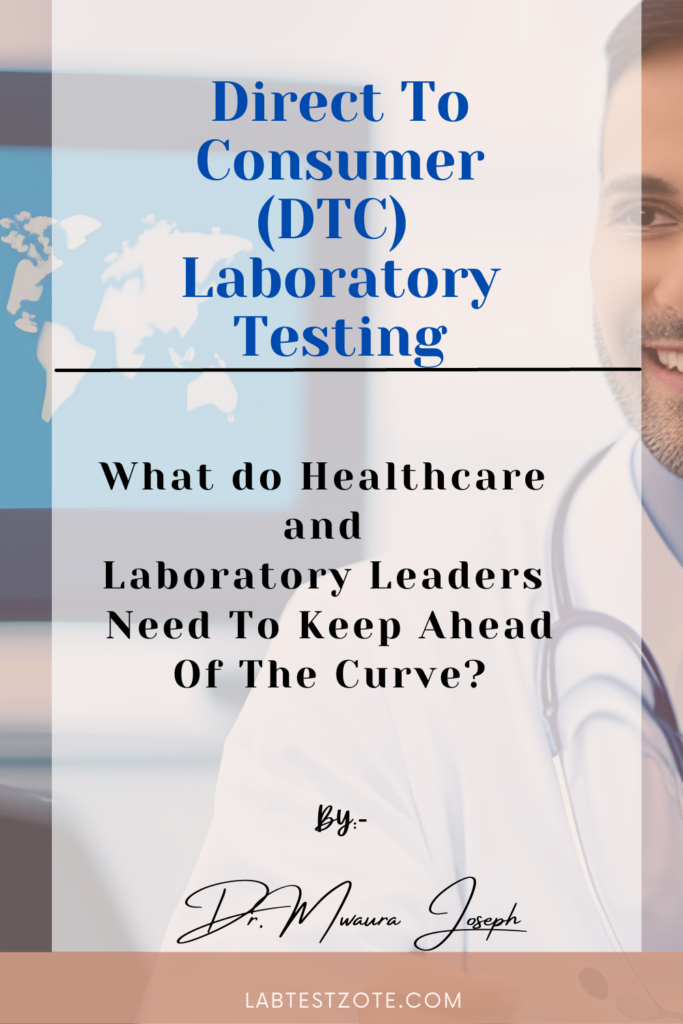New Dawn of Direct to Consumer Laboratory Testing
Preparing for and thriving in the era of Direct-to-Consumer (DTC) laboratory testing requires healthcare and laboratory leaders to embrace change, stay ahead of evolving trends, and prioritize patient-centric care.
I covered the emerging trend in walk-in laboratory testing here.
As a recap, DTC means patients or clients present themselves to the laboratory without going to a doctor first. Other terms used to describe this phenomenon include walk-in lab tests, patient initated lab tests etc.
The market for direct to consumer laboratory is grow by over 40% in the next 5-10 years. As such, players in the industry need to prepare adequately for this shift in the market.

Here are several strategies to help leaders adapt and succeed in this rapidly changing landscape:
1. Stay Informed and Educated
Leaders and laboratory medicine practitioners must continuously update their knowledge about DTC laboratory testing trends, regulations, and emerging technologies. This includes attending conferences, workshops, and staying informed through industry publications.
2.Embrace Technological trends
The way people discover your services is very different from the provider initiated testing. Testing companies now need to be active online, invest in normative and consumer centric websites. They need to be active in social media spaces where their clients hang out.
The walk-in customer is getting accustomed to comonditised laboratory services.
Laboratories have to Invest in cutting-edge technologies to streamline laboratory operations, enhance data security, and improve testing accuracy. Automation, artificial intelligence, and data analytics can optimize processes and provide more efficient services.
3. Enhance Data Security
As DTC laboratory testing involves sensitive patient data, leaders must prioritize robust data security measures. Implement encryption, access controls, and compliance with data protection regulations. Kenya data protection laws have been tightened up significantly, laboratories need to play safe and safeguard patient information.
Online patient portals enhance patient experience and offer much needed convenience in accessing results. The flipside is increased exposure to data breaches, measures need to be devised to
4. Collaborate with independent DTC Providers
The trend towards DTC testing has opened up the field of laboratory medicine to non-traditional players. We are seeing an influx of online testing companies. Think of them as the Uber for laboratory testing.
Existing laboratories need to forge partnerships or collaborations with DTC laboratory testing providers. This can help traditional healthcare institutions expand their service offerings and reach a broader patient base. Explore opportunities for integrated care models that combine in-person healthcare with DTC testing.
5.Focus on Quality Assurance: A Priority in Direct To Consumer Laboratory Testing
Continous improvement is the bedrock of laboratory services. Maintain rigorous quality control and assurance standards to ensure accurate and reliable test results. This is essential for building and maintaining trust with patients who may choose DTC services.
Additionally, the quality of the whole experience is no longer confined to the 4 walls of the laboratory but in the full glare of social media. Providers are under more scrutinty to walk the talk as far as their quality assurance goes.
Additionally, laboratories need to develop quality frameworks for these emerging patient interactions
6. Patient Education and Laboratory tests Result Interpretation
Laboratories have to expend time and resources creating educational resources and materials to help patients understand the benefits and limitations of DTC testing. Encourage informed decision-making and promote the importance of consulting healthcare professionals for result interpretation.
These resources maybe inhouse or outsourced to partners in the clinical practice. Essentially patients should be linked to the care they need based on the results.
7. Regulatory and ethical compliance
Laboratories need to stay compliant with all relevant regulations and standards governing laboratory testing.
They should also monitor and adapt to changes in regulatory requirements, especially as DTC testing regulations evolve. In Kenya, the Ministry of Health and Kenya Medical Laboratory Technicinans and Technologists Licensing Board (KMLLTB) have not yet published regulations specific to DTC testing. My expectation is this will change in the new future and bring regularatory clarity to this field.
Novel ethical concerns related to DTC laboratory testing are likely to emerge within your organization. This includes issues surrounding data privacy, consent, and potential misuse of genetic information.
In particular, laboratories need to balance the need to make profits and suitability or clinical utility of the tests.
8. Adapt Marketing Strategies
Traditional healthcare and laboratory leaders may need to adapt their marketing strategies to compete with DTC providers. Highlight the benefits of in-person care, personalized treatment plans, and the expertise of healthcare professionals.
In the age of social media, laboratories need to shift to more story-telling rather than benefits.
Specifically, leaders need to encourage active seeking for feedback from patients who use direct to consumer laboratory testing services and adapt offerings based on their suggestions and needs. Building a patient-centric approach is essential for long-term success.
9.Customize Services
Tailor services to meet the evolving needs of patients who may use DTC testing. This could involve offering specialized consultations, preventive care programs, or packages that incorporate DTC tests into overall healthcare plans.
We are seeing testing companies developing specific packages for different demographics. They need to monitor these and continue to develop more to cater for other patients groups.
10. Training, Research and Innovation
Laboratories need Invest in training and development programs for laboratory staff and healthcare providers to ensure they are well-equipped to handle the evolving landscape of DTC testing.
Facility leaders need to facilitate research and innovation within your organization. Explore new testing methodologies, treatments, and technologies to stay at the forefront of healthcare delivery.
In Kenya for example, providers need to monitor developments in other mature markets and plan for the same.
Regularly assess the competitive landscape and adapt your strategies accordingly. Understand what sets your organization apart and leverage those strengths.
In summary, healthcare and laboratory leaders can thrive in the era of DTC laboratory testing by remaining adaptable, patient-focused, and technology-savvy. By embracing change and proactively addressing challenges, leaders can position their organizations for long-term success in this evolving healthcare landscape.
